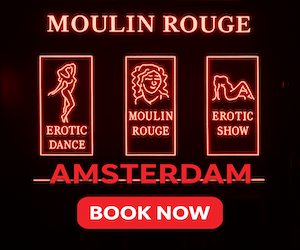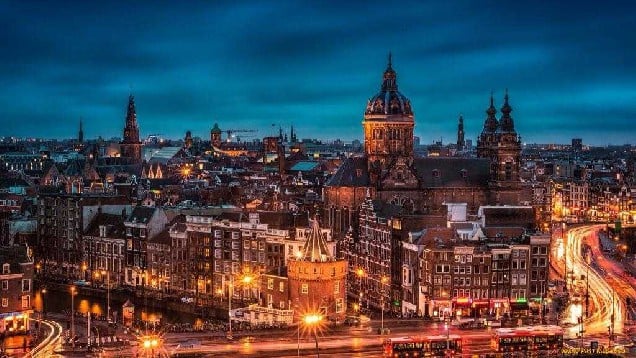
De Wallen in Amsterdam: Alles Wat Je Moet Weten in 2025
De Wallen van Amsterdam: De Ultieme Gids
Ontdek de Wallen in Amsterdam met ons! Dit makkelijk te lezen overzicht behandelt alles, van de geschiedenis tot de hedendaagse scene. Perfect voor iedereen die nieuwsgierig is naar deze beroemde plek. Lees verder voor meer informatie!
MOULIN ROUGE AMSTERDAM TICKETS
Wat is er te doen op de Wallen in Amsterdam?

1. Sekswerk en entertainment voor volwassenen
- Raam bordelen: Sekswerkers stand in windows to offer their services. Prostitution is legal and regulated.
- Erotic Shows: Places like Moulin Rouge offer live erotic performances.
- Sex Shops: Shops selling adult seksspeeltjes, lingerie, and other products.
- Peep Shows and Strip Clubs: These stripclubs in Amsterdam offer short adult performances for a fee.
2. Museums
- Red Light Secrets Museum: Learn about the lives of sex workers and the history of prostitution.
- Erotic Museum: Explore art and exhibits related to sex and erotica.
- Hash, Marihuana & Hemp Museum: Learn about cannabis and hemp history and culture.
- Sex Museum: One of the oldest museums about sexuality.
3. Coffeeshops
- You can buy and smoke cannabis legally in the Red Light District. Famous coffeeshops include Grey Area, The Bulldog and Green House.
4. Historic and Cultural Spots
- Oude Kerk (Old Church): The oldest building in Amsterdam, located in the district.
- Canals and Dutch Architecture: Walk around the scenic canals and old buildings.
5. Bars & Restaurants
- The red light district has many bars en restaurants with a vibrant nightlife. You can find local Dutch food and international dishes.
6. No Guided Tours
- Group guided tours are no longer allowed in the Red Light District. However, you can explore the area on your own with this Amsterdam Red Light District tour.
7. Shopping
- Small shops offer souvenirs, crafts, and unique gifts.
De Wallen zijn veilig en gereguleerd, maar wees respectvol. Maak geen foto's van sekswerkers of in bordelen.
History & Evolution of the Red Light District

The Red Light District, known locally as De Wallen, is not just a major tourist attraction in Amsterdam; it’s a significant part of the city’s historical fabric.
Dit gebied wordt al sinds de 14e eeuw in verband gebracht met sekshandel, oorspronkelijk vanwege de nabijheid van de haven van de stad.
De meeste mensen realiseren zich niet dat de Amsterdamse Wallen een van de oudste en meest historische buurten van de stad zijn. Het draait hier niet alleen om het nachtleven: er is hier ook ongelooflijke architectuur, verborgen kerken en eeuwenoude verhalen.
Martijn Snoeren, Senior local guide
Door de eeuwen heen ontwikkelde het zich van een louche buurt met een reputatie voor ondeugd tot een gereguleerd en drukbezocht deel van Amsterdam. De afgelopen jaren heeft de wijk transformaties ondergaan om de negatieve aspecten ervan, zoals mensenhandel en criminaliteit, terug te dringen.
Deze inspanningen bestaan onder meer uit initiatieven vanuit de stad om het aantal rosse buurten te verminderen en deze te vervangen door kunstgalerieën, boetieks en andere bedrijven.
We find the history of De Wallen very interesting. It goes back to the origins of the Dutch capital. In our opinion, Amsterdam Red Light District shows the liberal thinking of the Dutch.

The Red Light District stands as a testament to Amsterdam’s liberal attitudes but also reflects the city’s ongoing struggle to balance tourism, local life, and the well-being of sekswerkers.
Visitors today will find a blend of historical buildings, museums (like the famous Red Light Secrets – Museum of Prostitution), bars, sex shows and the characteristic red-lit windows.
De ontwikkeling van het gebied is voortdurend gaande en inzicht in de geschiedenis ervan biedt cruciale context om de complexe huidige status ervan te kunnen waarderen.
Juridische en sociale aspecten van de Amsterdamse Wallen

De Wallen opereren binnen een uniek juridisch kader dat Amsterdam onderscheidt van de meeste andere steden.
Prostitutie is sinds 2000 legaal en gereguleerd in Nederland. Sekswerkers moeten zich inschrijven bij de Kamer van Koophandel en belasting betalen. Deze wettelijke erkenning is bedoeld om betere arbeidsomstandigheden en bescherming voor sekswerkers te garanderen.
Evenzo zijn de verkoop en consumptie van cannabis in aangewezen coffeeshops gelegaliseerd, wat bijdraagt aan de liberale sfeer in het district. Deze wetten blijven discussie oproepen, waarbij sommigen beweren dat ze criminaliteit helpen verminderen en de veiligheid verbeteren, terwijl anderen beweren dat ze illegale activiteiten aanmoedigen.
Sociaal gezien heeft de Amsterdamse Wallen een dubbel karakter:
On the one hand, it’s a symbol of the city’s tolerance and progressive values.
On the other, it raises questions about morality, exploitation, and the commodification of bodies.
Het bestaan van de Wallen in Amsterdam en de aanpak van deze problemen door de stad worden vaak gebruikt als casestudies in discussies over de beste manier om de seksindustrie te beheren en reguleren.
Voor bezoekers is het essentieel om het gebied te benaderen met begrip van deze juridische en sociale complexiteiten, en te beseffen dat achter de aantrekkingskracht van het district een genuanceerde en vaak controversiële realiteit schuilgaat.
🚫 Red Light District Tours Banned – Here’s the Legal Alternative
Sinds 2020 verbiedt de gemeente Amsterdam alle rondleidingen in groepsverband langs de ramen van sekswerkers op de Wallen. Deze aanpassingen zijn doorgevoerd om overlast te verminderen, de privacy te beschermen en het unieke karakter van de buurt te behouden. Traditionele rondleidingen zijn daarom niet langer toegestaan op De Wallen. Maar dat betekent niet dat je de buurt niet op een respectvolle en geïnformeerde manier kunt verkennen.
De enige legale en respectvolle manier om de Wallen vandaag de dag te verkennen, is met onze gps-geleide audiotour, ontwikkeld in samenwerking met 22 lokale experts, waaronder historici, politieagenten, sekswerkers en buurtbewoners. Je kunt de omgeving in je eigen tempo verkennen, met nauwkeurig en actueel commentaar dat automatisch wordt geactiveerd op basis van je locatie.
🎧 Beleef de Amsterdamse Wallen als een local - download de tour hier:
👉 Red Light District Audio Tour
Cultural Significance & Misconceptions
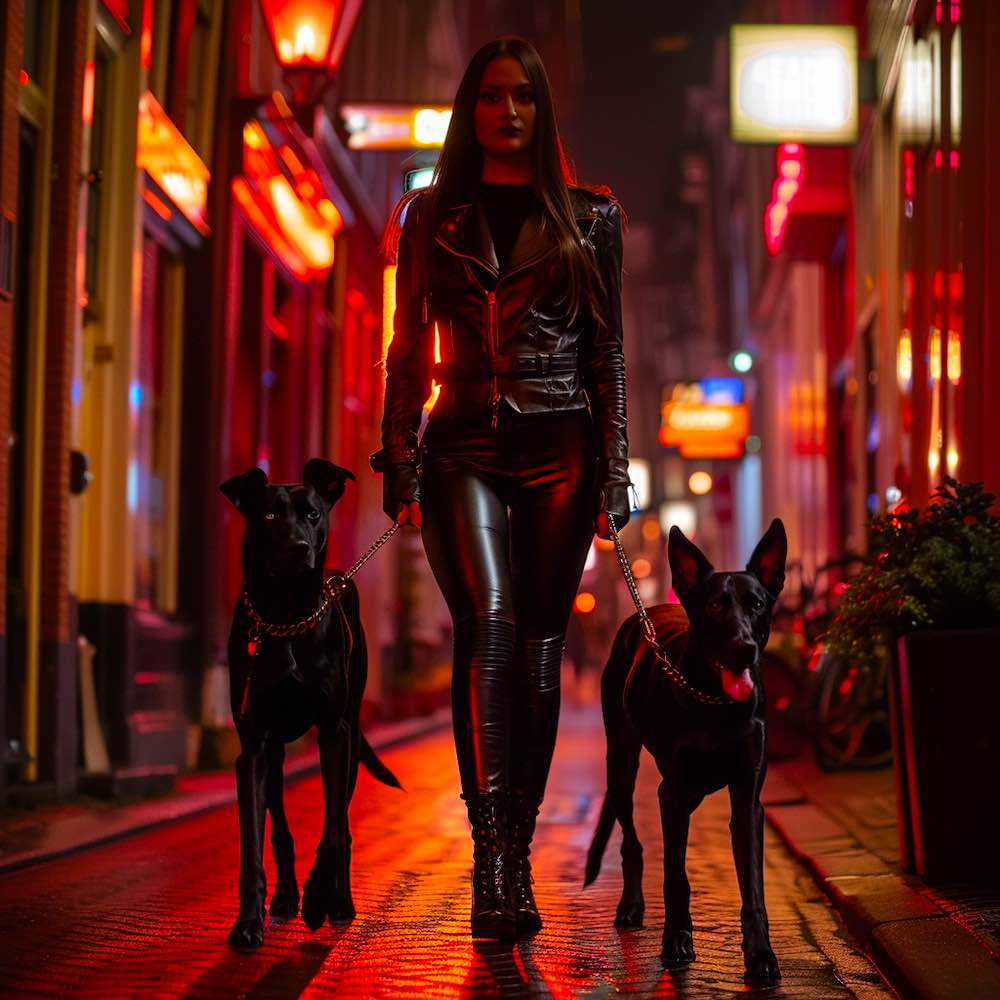
De Wallen in Amsterdam zijn niet alleen een centrum voor entertainment voor volwassenen; het is ook een cultureel monument met een grote betekenis voor de hoofdstad van Nederland.
Het belichaamt de historische tolerantie en liberale houding van de stad ten opzichte van kwesties die elders als taboe worden beschouwd. Deze rosse buurt wordt echter vaak verkeerd begrepen door buitenstaanders.
Many view it merely as a tourist destination without appreciating its cultural and historical significance. The area is not just about sex and drugs; it’s a living, breathing part of the city with a rich history and a diverse community.
Misvattingen over de Wallen in Amsterdam komen vaak voort uit sensationele mediabeelden die de nadruk leggen op criminaliteit en losbandigheid. Hierdoor worden de culturele rijkdom van het gebied en het dagelijks leven van de mensen die er werken en wonen, overschaduwd.
In werkelijkheid is de Wallen een complex gebied waar kunst, geschiedenis, handel en kwesties rond sociale rechtvaardigheid samenkomen.
Er zijn pogingen gedaan om het imago van de stad te verbeteren, waarbij de nadruk ligt op de culturele aspecten, zoals de architectuur, de historische grachten en de unieke bedrijven die naast de seksindustrie bestaan.
Visitors are encouraged to look beyond the surface to understand the district’s true nature and significance in Amsterdam’s cultural landscape.
De ongecensureerde Wallen in Amsterdam zijn een gebied dat door hun unieke karakter veel vragen oproept. Stop met zoeken naar de juiste informatie. Dat is niet langer nodig. Je hebt het zojuist gevonden! Ontdek nu de belangrijkste feiten over de Wallen in Amsterdam.
GET AMSTERDAM APP >Feiten over de Amsterdamse Wallen
Ontdek hieronder deze feiten voordat u op bezoek komt!

1 | Red Light District is ook wel bekend als De Wallen
This neighbourhood is known worldwide as the Red Light District, but in the Netherlands it is called De Wallen.
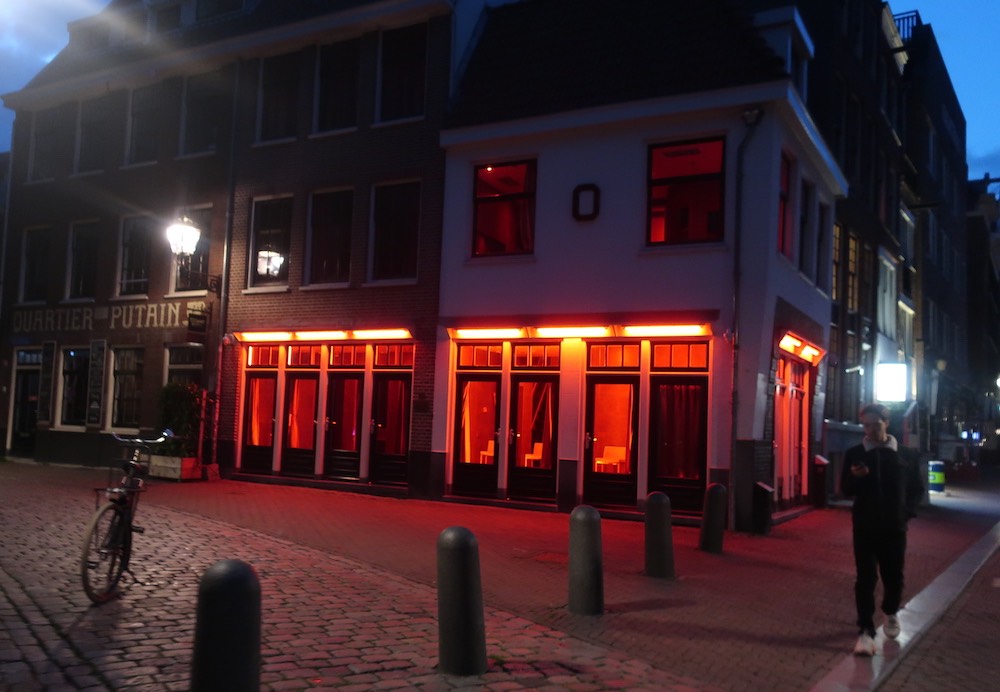
A city archaeologist describes (during this Amsterdam Red Light District tour) what De Wallen means:
The word ‘Wallen’ comes from the canals that cross section the Red Light District; the Oudezijds Voorburgwal and the Oudezijds Achterburgwal. A ‘burgwal’ means ‘defensive wall’ with a canal in front, but now the name is used for the canals itself, which were dug as a defense for Amsterdam.
2 | De Wallen Amsterdam heeft 201 raambordelen (peeskamers)
With 201 window brothels, De Wallen is the largest prostitutie area in the Netherlands. The window brothels are rented out by window brothel operators during the day and at night.
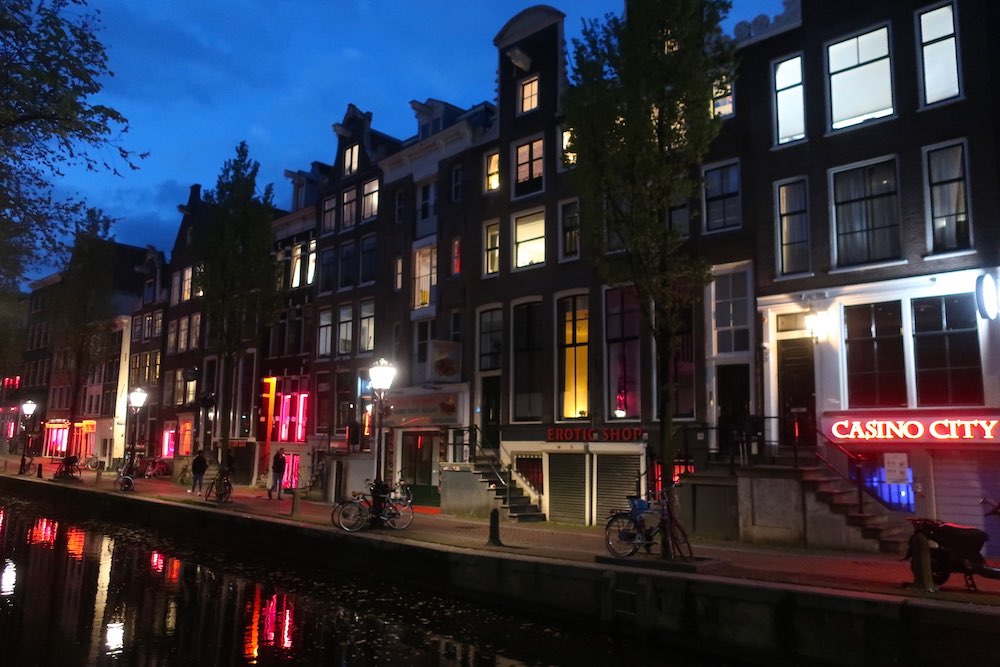
De Wallen can accommodate up to 402 sekswerkers per day. However, it never happens that all Red Light windows are rented out during the day as well as at night.
Over time, the number of raambordelen in Amsterdam decreased significantly. In 2011 this neighborhood still had 297 window brothels. And in 2006 this number was even 401.
3 | Het heeft 350 sekswerkers
It’s estimated that there are about 350 prostituees working in the Red Light District in Amsterdam.

The majority of the prostitutes prefer to work night shifts.
4 | De Wallen kunnen 24/7 bezocht worden
The Red Light District in Amsterdam is always open to visit. This is partly because it is an inhabited neighborhood. That is why De Wallen can be visited 7 days a day, 24 hours a day.

However, it is not the case that everything in the area is accessible 24/7. The window brothels are closed between 6am and 8am. Most restaurants close at midnight. And bars are open until 3 PM on weekends.
5 | Prostituees accepteren geen creditcards
Although many sekswerkers would, they cannot accept credit card payments. This is because payment companies do not want to be associated with sex work.

As a result, payment companies and banks do not accept sex workers as customers. Therefor, sex workers’ clients cannot pay by credit card.
6 | Het kost tenminste 50 euro om seks te hebben met een raamprostituee
Window prostitutes in Amsterdam charge at least 50 euro for sex for 15 minutes.
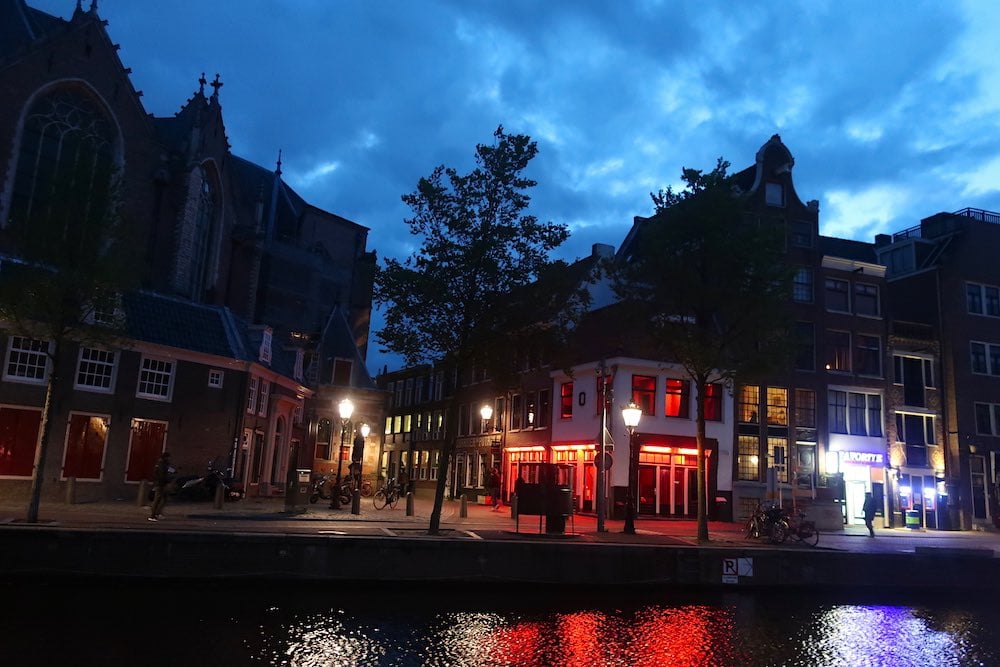
Customers and prostitutes usually negotiate prices and services at the entrance of the window brothel.
7 | It Has 4,465 Inhabitants
The Red Light District is currently inhabited by 4,465 residents. In 2019, De Wallen had 4,295 inhabitants.

The age distribution of the residents in the Red Light District looks like this:
✦ 0 – 15 years: 200 inhabitants
✦ 15 – 25 years: 695 inhabitants
✦ 25 – 45 years: 2,195 inhabitants
✦ 45 – 65 years: 940 inhabitants
✦ > 65 years: 425 inhabitants
The above figures come from this population survey.
8 | 1,757 Crimes Are Committed Annually
In 2020, 1,756 crimes were recorded by the police in the Red Light District in Amsterdam.

The top five most committed crimes in this neighborhood:
- Property crimes
- Pickpocketing
- Violation of public order
- Theft of bicycles or mopeds
- Shoplifting
Local crime investigation in Amsterdam has shown the above figures.
9 | Cannabis Shops Do Not Allow The Use Of Tobacco
It is not allowed to smoke tobacco in cannabis shops which are also known as coffeeshops.

In the Netherlands it is prohibited by law to smoke tobacco inside public buildings such as restaurants, cafes, museums, etc.
Since September 2019, in addition to a smoking ban, there is also a smoking room ban in the catering industry. Smoking areas may no longer be used in all catering establishments.
Because coffeeshops fall under the catering industry, tobacco smoking areas are no longer allowed in coffeeshops. Smoking is still allowed in the coffee shop without tobacco, with tobacco substitutes or with vaporizers.
There are 9 laws for coffeeshops in Holland which must be strictly adhered to.
10 | There Is A Daycare Next To Window Brothels And 5D Porn Cinema
In the heart of the Red Light District there is a daycare center for the children of the neighbourhood. To the left of this kindergarten is a 5D Porn Bioscoop. And on the right side are 6 window brothels in which prostitutes from Latin America work.
11 | The Oude Kerk Is Amsterdam’s Oldest Building
It dates from the year 1213, making De Oude Kerk. the oldest building in Amsterdam.
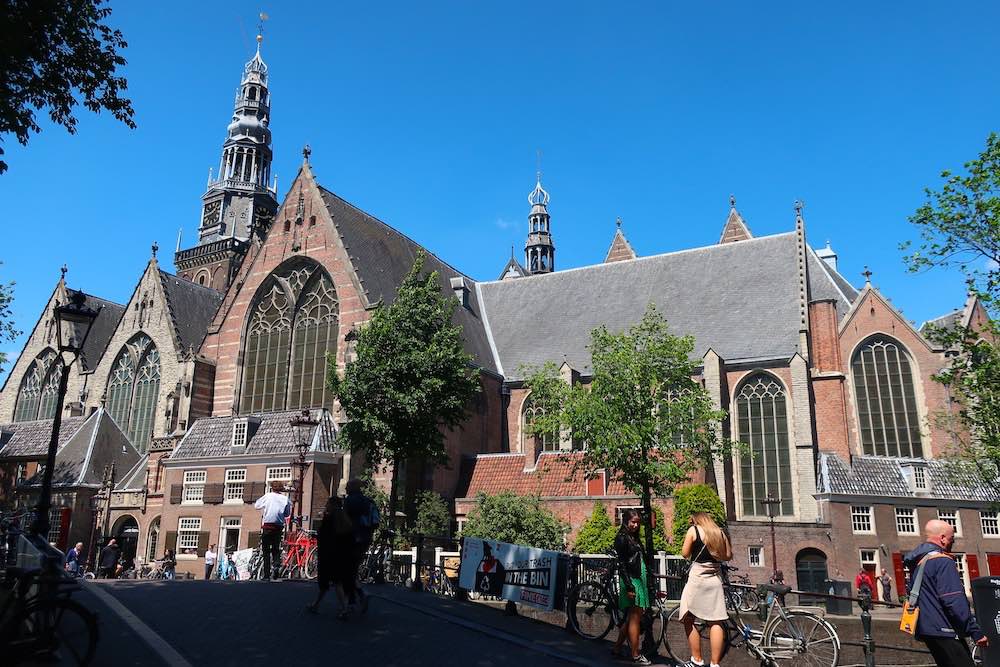
It’s located in the heart of the Red Light District and surrounded by window brothels with prostitutes. Making it not only the oldest building in Amsterdam, but also one of the most special buildings in the world.
This is the only active church in the world where window brothels with sekswerkers are only meters away.
On the side of the Oude Kerk are not only window brothels, but also a daycare center. And next to that, the Amsterdam 5d Porn Cinema.
We believe that De Oude Kerk is a must-visit because it’s the oldest building of Amsterdam. During our visit to this church we totally forgot being in middle of the Red Light District.
12 | If You Buy Cannabis At The Bulldog, Part Of It Goes To The Salvation Army
When you buy weed or hash at Amsterdam’s most famous coffee shop, part of it automatically goes to charity.
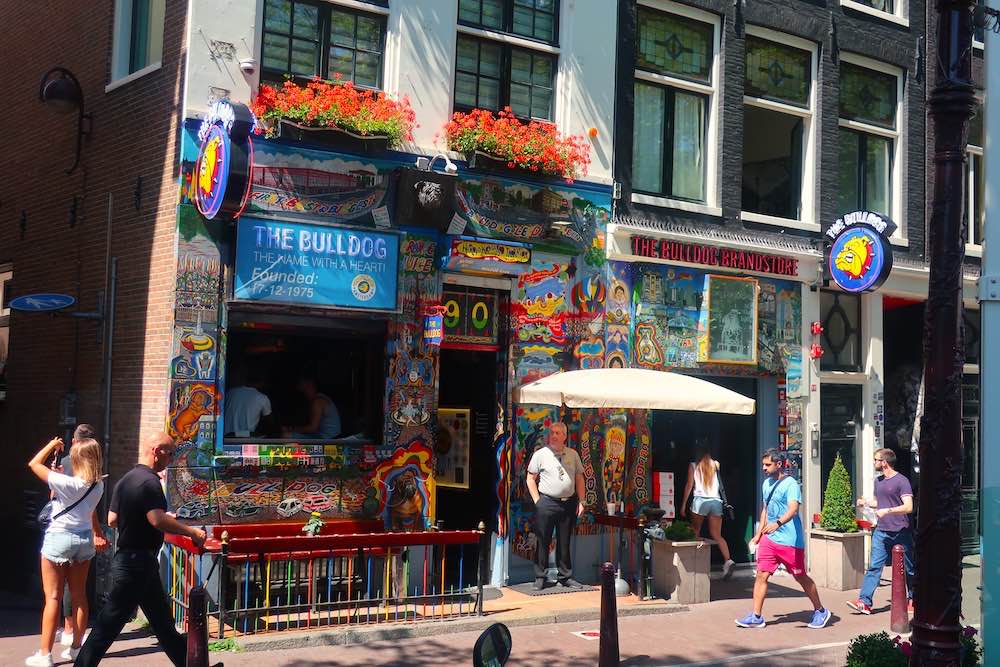
The owner of the famous coffeeshop The Bulldog – Henk de Vries – donates part of his turnover to the Salvation Army every year. And every Bulldog employee must also work one day a year at the Amsterdam’s Salvation Army.
This is because Henk de Vries was born and raised in the Red Light District. In his early teens, he was helped by the Salvation Army front woman who put him on the right path. She made sure that he behaved well, which was an essential part of his successful entrepreneurship in later life.
In this Dutch radio interview Henk de Vries said that without the help of Major Bosshardt – he would not have become successful.

As an eternal thanks for this, Henk de Vries continuously provides financial support to the Salvation Army. This organization provides shelter, food and mental support for the homeless.
13 | Rembrandt Got Married In The Red Light District
On June 10, 1634, Rembrandt married Saskia Uylenburgh in the Oude Kerk. located in the De Wallen.
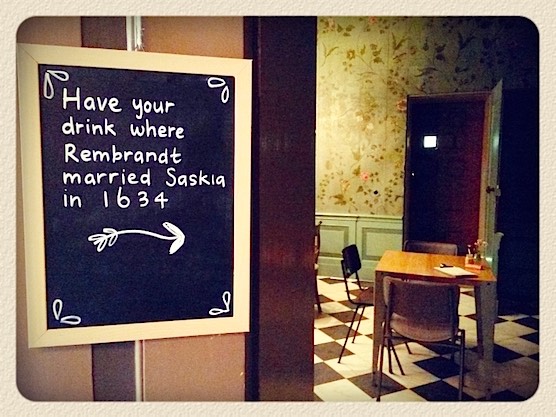
On this day, the Dutch painter signed the marriage register of the Oude Kerk in Amsterdam. Reverend Johannes Silvius signed the marriage register for Saskia Uylenburgh. The civil wedding also took place in the Oude Kerk.
14 | World’s First Stock Exchange Was Founded Here
The Dutch are known for their commercial spirit. This was also the case in the past.
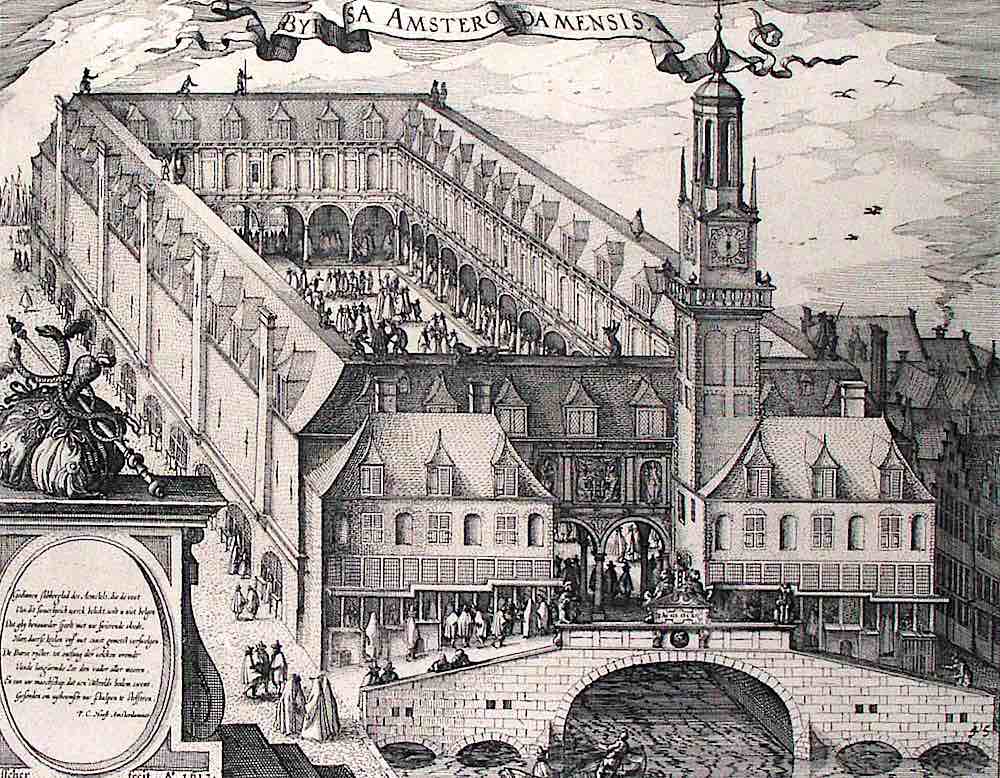
In the 17th century, the Dutch set up the first stock exchange in the world. Right in the Red Light District. Still today you can see the Amsterdam stock exchange from the Red Light District.
Go to the Warmoesstraat. It’s the building diagonally opposite the Condomerie.
15 | The Oldest House In Amsterdam Is Now A Gay Fetish Club
On Warmoesstraat 90 – an entrance street in the Red Light District – you can find the oldest preserved house in Amsterdam. This house dates from 1485.
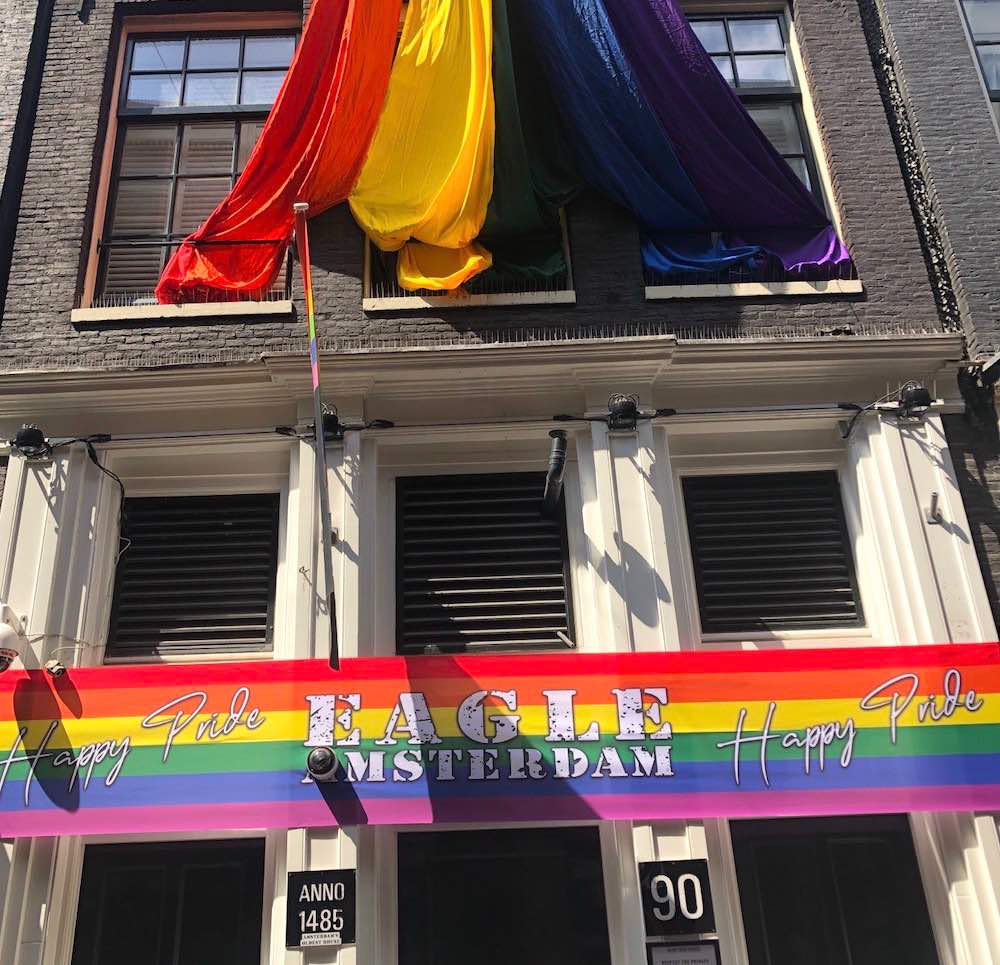
Currently a gay club is located here where erotic parties are given. It is only accessible to men.
The second oldest in Amsterdam dates from 1528 and is located in the Begijnhof.
16 | Prostitutes Do Not Want To Be Photographed
Do not take pictures of the sekswerkers in the Red Light District. They do not want this. Often for privacy reasons.

Sex workers often lead a double life. Not everyone in their area is aware of their work as a prostitute. Respect this, follow the local etiquette and do not make pictures of prostitutes.
Do you really want to make a good impression on the sekswerkers? Kindly say goodbye to them when you walk by.
It is of course allowed to take photos of all other highlights in the Red Light District.
17 | It Is Illegal To Drink Liquor On The Street
Local Amsterdam legislation does not allow drinking on the street in the Red Light District. Violation can be punished with a fine of 95 euros.
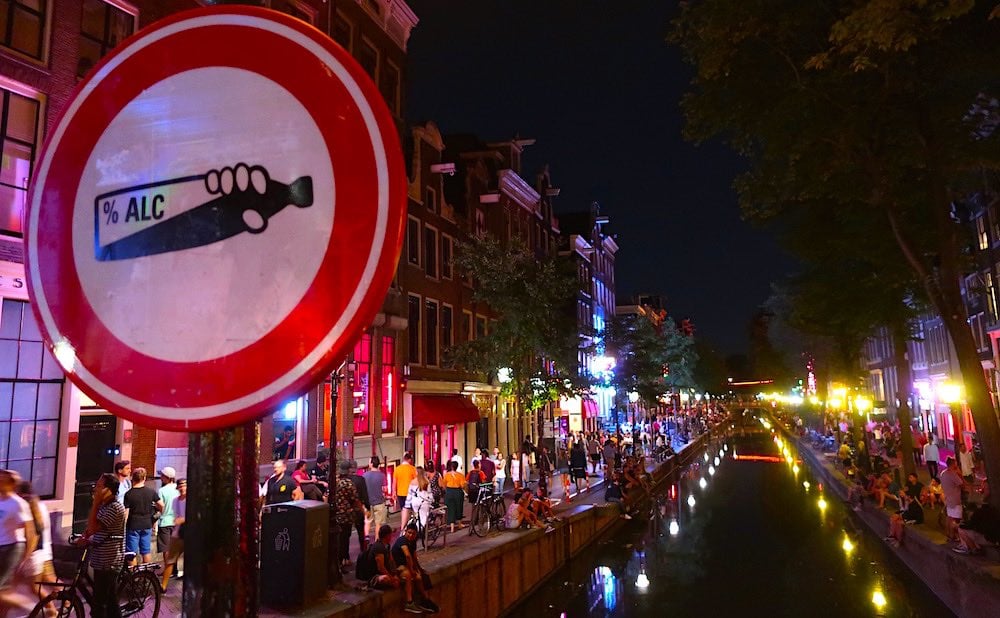
There are several signs in De Wallen that indicate that it is not allowed to drink alcohol in this area. It is allowed to consume alcohol on the terraces of the cafes and restaurants.
18 | There Are No Male Prostitutes For Women
In general, women do not have to pay for een man en vrouw liggend op een bed met witte lakens terwijl ze met elkaar zoenen tijdens een sexdate. This is the main reason why there are no straight male sex workers for female clients in Amsterdam’s Red Light District. The demand is simply too low and the cost are too high.
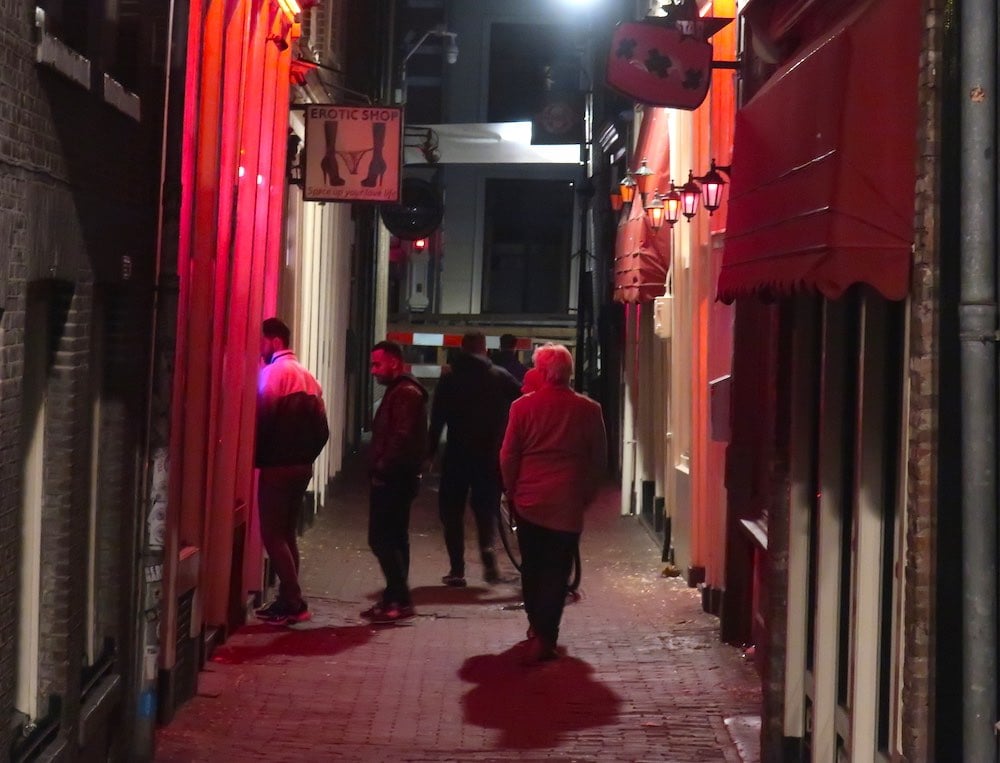
The low demand and high costs do not make it financially interesting for straight men to work in window brothels.
Women who are willing to pay for sex can do this in Amsterdam with male escorts. This method of sex work is financially interesting for straight male escorts. This is because they do not have to rent a window brothel, which is associated with high costs. The male escorts can then simply wait until they are booked via the internet or by telephone.
Straight women who book escorts often have an erotic fantasy that they have fulfilled.
Most male escorts in The Netherlands are gay.
19 | Area With Most Space For Pedestrians in Holland
Of all neighborhoods in the Netherlands, the Red Light District ranks fifth as a neighborhood with the most space for pedestrians.
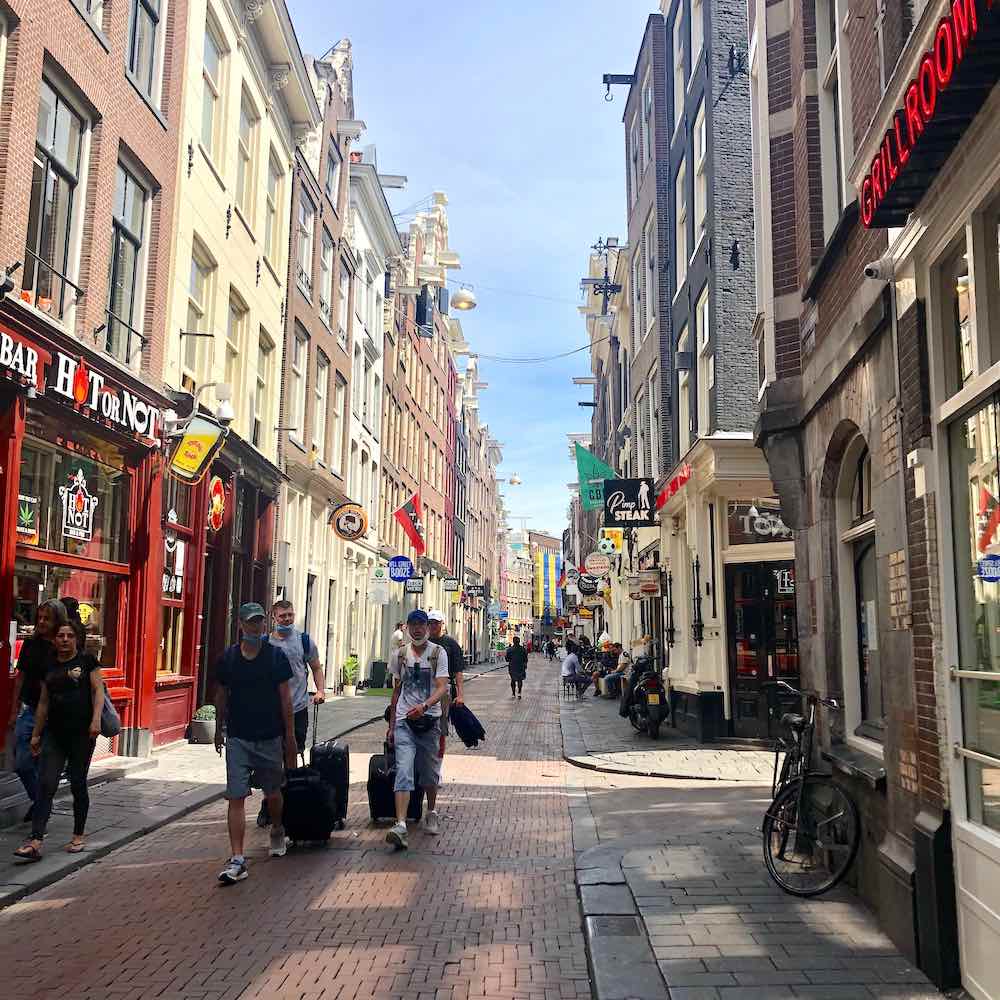
It shares the place with another neighborhood in Amsterdam, namely the Spaarndammer and Zeeheldenbuurt. This is evident from a study that examined the spatial distribution in Dutch neighborhoods.
20 | De Wallen Counts 2,095 Companies
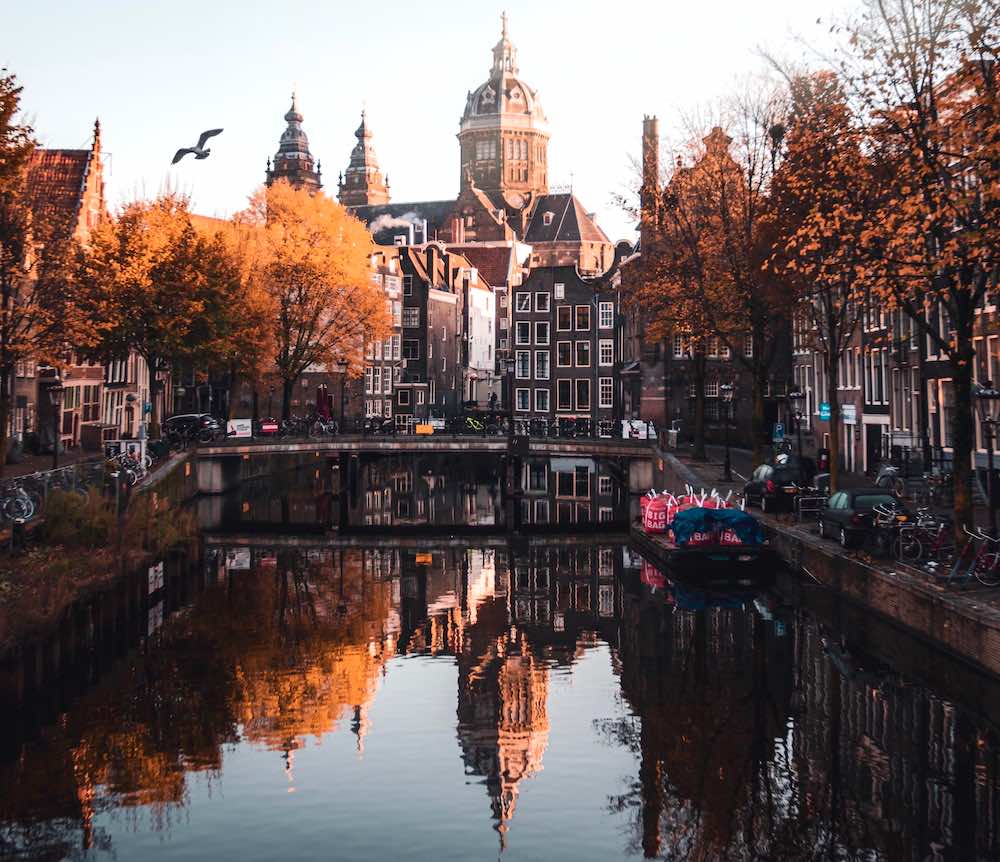
The Burgwallen Oude Zijde District has a total of 2,095 business locations. This data was collected and published in 2019 by AlleCijfers.nl
21 | Magic Truffles Are Sold In Smart Shops
In the Netherlands it is allowed to buy so-called magic truffles from the age of 18. Smartshops are allowed to sell these psychedelic drugs.
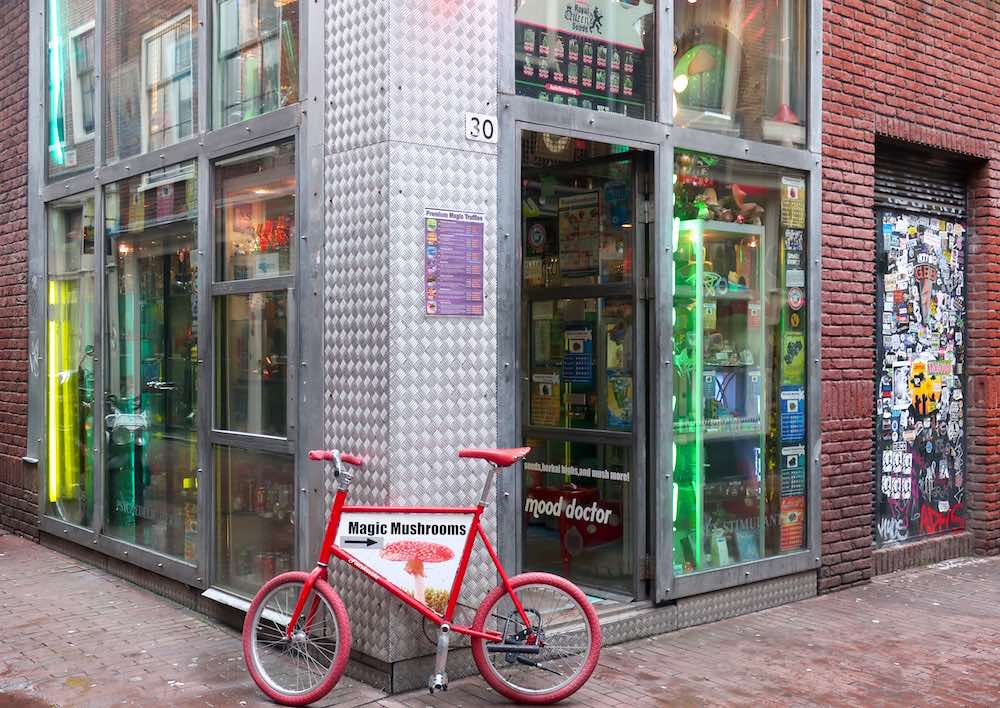
The staff members of these smart shops are also obliged to properly inform customers. There are four smart shops in the Red Light District where magic truffles.
22 | Belle Is A Sex Worker Statue
Amsterdam’s Red Light District is one of the few places in the world where there is a statue for sekswerkers.
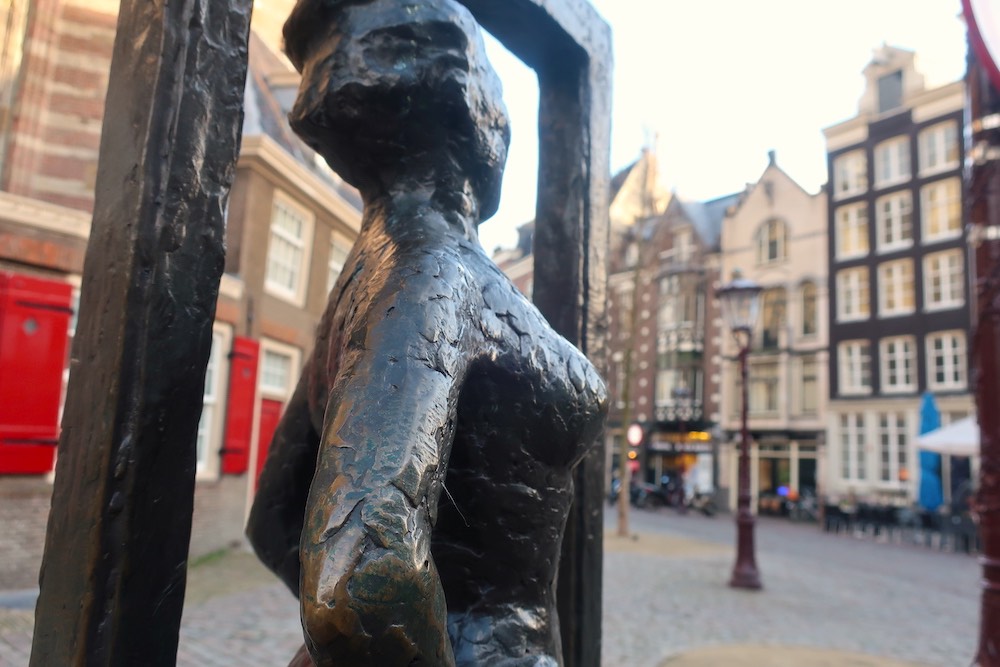
It stands in the middle of the area, next to De Oude Kerk. The statue is called Belle. A fictional person stands in a window brothel and represents all the sex workers in the world. On the statue is written: Respect sex workers around the world.
The initiative for this sex worker sculpture came from Mariska Majoor. She is an ex prostitute, founder of the Prostitution Information Center and sex worker activist.
23 | It Counts 5 Museums
Red Light District in Amsterdam has five museums. One about Dutch history and religion, one about cannabis, one about sex, one about prostitution and one about watches.
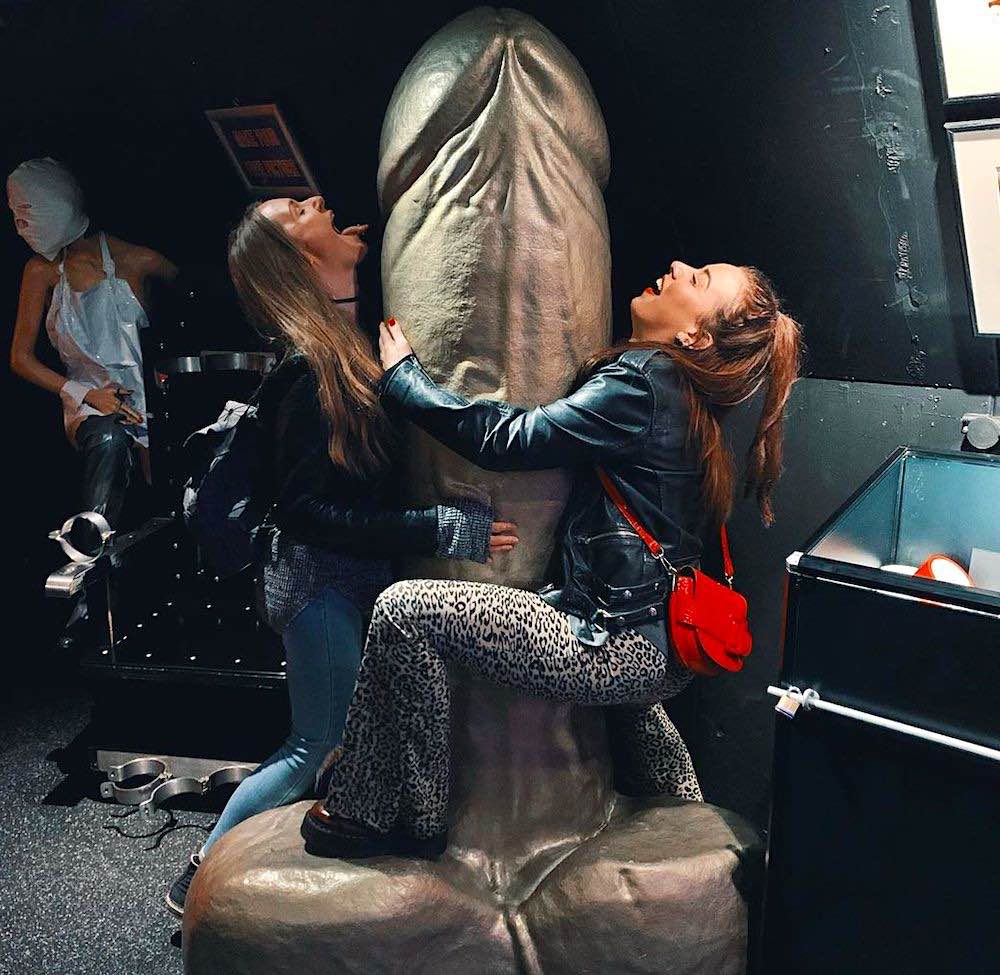
Discover these 5 Incredible Museums in Amsterdam here and get the best e-tickets now!
24 | Fish live in the canals of Amsterdam
Many different types of fish live in the canals and rivers of Amsterdam. Pike, roach, perch, bream and carp can be found in the canals of Amsterdam. Also in the Red Light District.
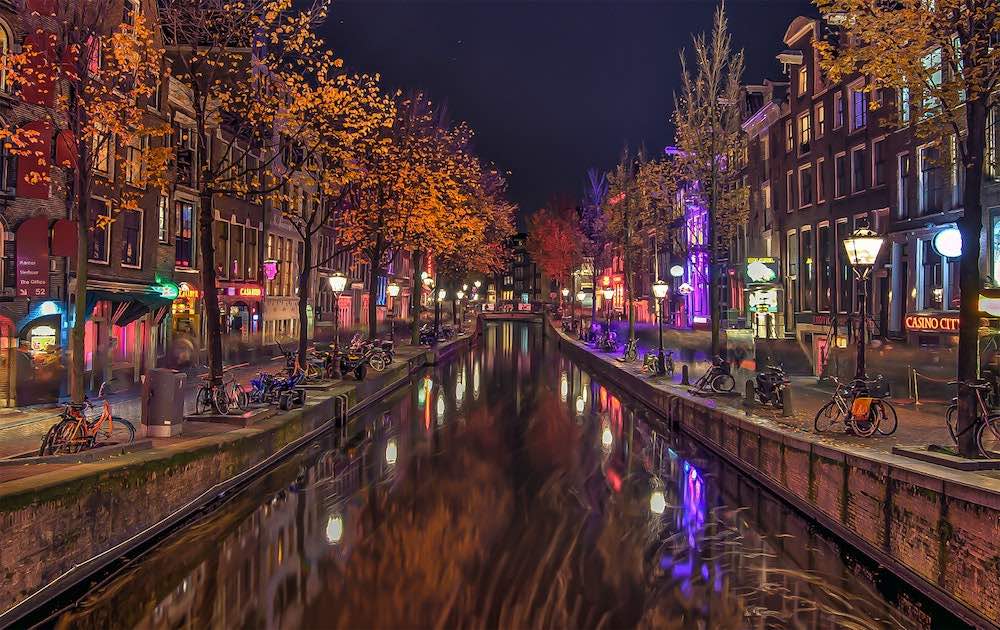
There is hardly any fishing here. However, magnet fishermen can be spotted regularly.
The future: Amsterdam’s proposed Erotic Centre (2025 status)
The city has explored creating an Erotic Centre elsewhere in Amsterdam to reduce nuisance and improve working conditions. Proposals change over time; the current plan does not mean De Wallen is closing today.
- What visitors should know: De Wallen remains open. Any long-term changes will be gradual and announced well in advance.
- How to follow updates: Watch official municipality announcements and our News section for summaries.
Meanwhile, please visit respectfully: read the rules, use our map, and consider the Audio Tour for context.
ONTDEK OOK:
Kaart van De Wallen van Amsterdam
